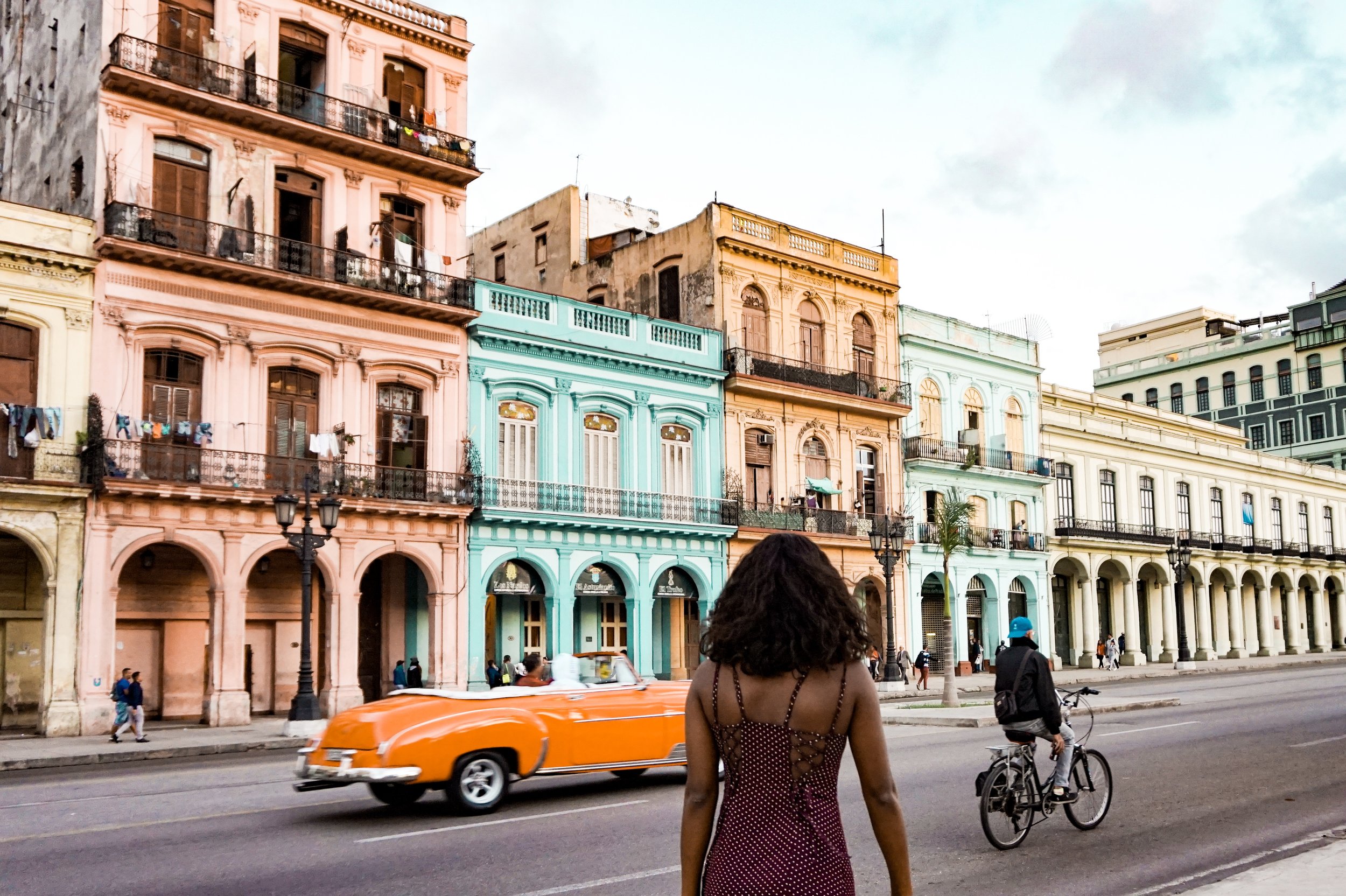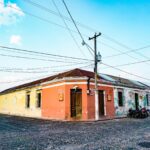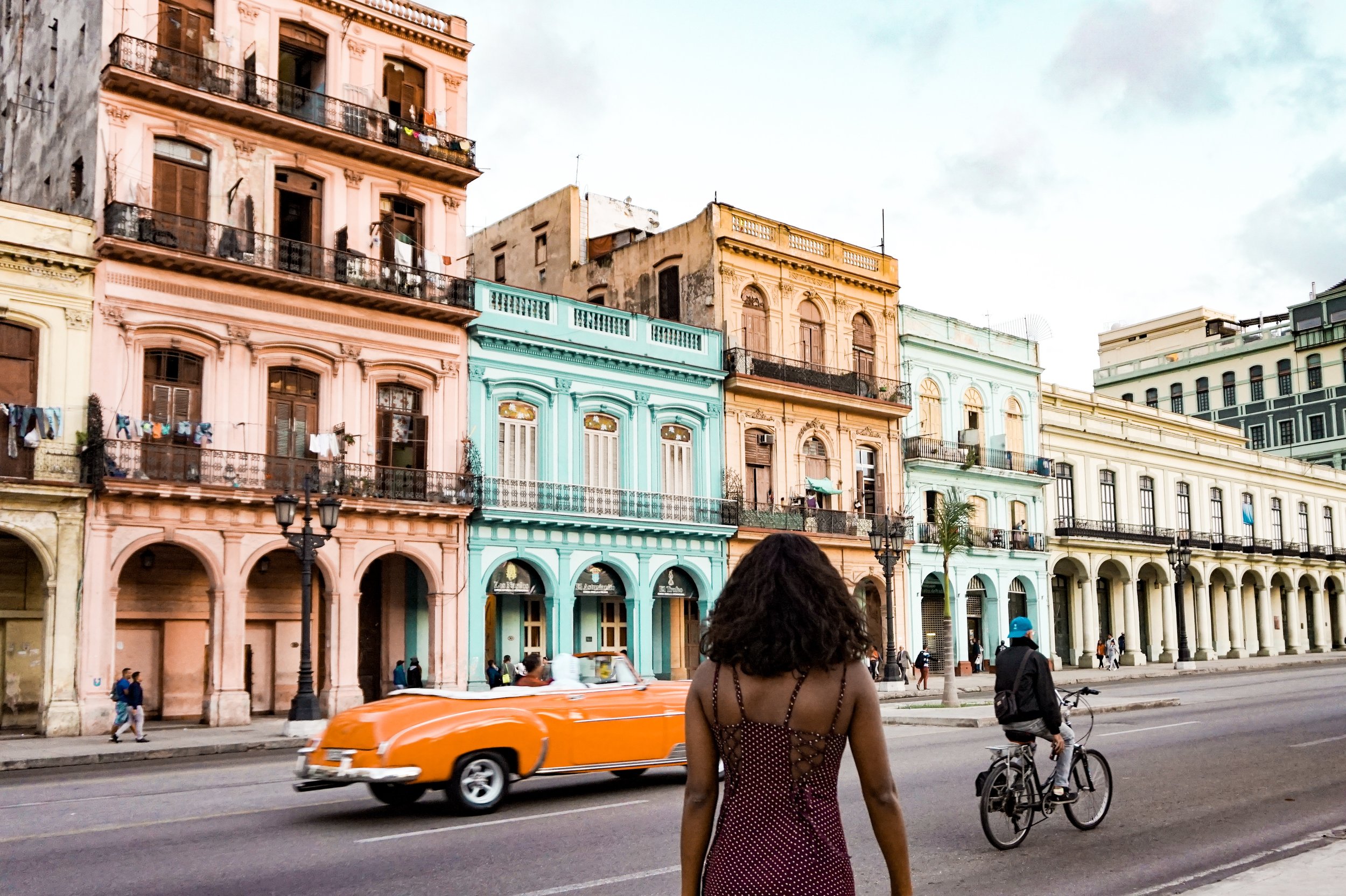What to Know Before you go to Cuba | Cuba Travel Guide 2018
What to know before you go to Cuba. Is Cuba on your bucketlist? Are you headed there soon? Are you worried about getting into the country as a US Citizen? Keep reading for information to help you plan & get the most out of your trip to Cuba.
In December 2017, I spent 2 weeks traveling through Cuba. I dreamed of visiting the Carribean Island – to feel the spirit of a country so different than my own, to engage with the people, and to soak in the island’s culture. However, I never thought it would be possible due to the trade embargo that was implemented over 50 years ago. Like many Americans, I was excited to feel the island’s magic once US travel restrictions were lifted in 2016. When the rules changed again in November 2017, it seemed like I missed my opportunity to visit Cuba. After digging a bit deeper, I found out that it was still possible to travel there as a US citizen. On short notice, I booked my flight with a plan to spend 2 weeks exploring the country.
After returning, I can say that Cuba is one of the most captivating places I’ve ever visited. Traveling through Cuba was a challenge at times, but it’s well worth the reward. To make the most out of your visit, There are some things you should know!
CAN US CITIZENS VISIT?
YES! I traveled to Cuba independently in December 2017, after the US regulations changed. I flew with Southwest Airlines directly from the US and had zero issues entering/exiting the country. US citizens can still travel to Cuba independently or with a tour group!
CATEGORY SELECTION
Technically US “tourism” is not(and has never been) allowed. However, you can visit under one of 12 categories.
Under the Obama administration, US citizens could visit Cuba independently through the “People to People” category. This category is no longer available as of November 2017, but independent travel & group travel is now available under a new category called “Support for the Cuban People”.
Under this new category, you must spend the majority of your time doing activities that support the livelihood of the Cuban people. This might include:
- Staying at a Casa Particular(Cuban home)
- Eating at Paladares(privately owned restaurants)
- Attending cooking classes, salsa classes, etc. hosted by locals
The whole idea of the new changes we’re to limit support of the Cuban military, so these changes make it necessary for US visitors to travel in a way that directly benefits the citizens. In my opinion, this is the best way to travel anyway!
You are technically required to put together an itinerary/schedule for each day before entering the country and keep this schedule on record for up to 5 years if the US decides to verify that your visit met the requirements.
You can travel under this category as an individual or join a tour group, as long as your activities meet the criteria – more details here. Obviously, traveling independently cost less. However, tour groups are great for people who might not speak Spanish or just need a bit more comfort & guidance while traveling through the country.
I traveled independently, but spent two days exploring & creating content for Cuba Candela.
How to get to Cuba
I flew directly from the US with Southwest Airlines. Other US airlines that fly direct include JetBlue, American, United, Delta, and Southwest. When US citizens book a flight online, a ‘notice’ will pop up about the 12 category requirements. This is self-determined, meaning that you just need to check the box to purchase your ticket.
ENTRY REQUIREMENTS
All visitors must have a valid passport, return ticket, Visa, and proof of travel health insurance to enter the country.
Some airlines include insurance & visa costs in the ticket price. My airline ticket included travel health insurance, so it wasn’t necessary for me to buy separately. If you need to buy insurance separately, you can search HERE. The health insurance must cover medical evacuation by air, medical emergencies, and repatriation, so be sure to check the details before buying!
If your airline ticket doesn’t include a Visa, then you can simply purchase it at the airport. After checking in my for my flight, I was able to purchase my tourist card/visa at the Southwest ticket counter. The lines can be long, so be sure to arrive at the airport early.
I must admit that I was nervous about the entry process, but I had zero issues. Things couldn’t have gone smoother.
FORGET ABOUT WI-FI
Be prepared to disconnect. Internet access is certainly available in Cuba, but not in the way most of us are used to. It’s probably better to enjoy being disconnected, but there some things you should know if you do need to access the internet. Wifi access is very limited in 2 ways:
1. Wifi is restricted to certain areas, for both locals & tourists. There are public wifi-spots around the city – mostly in parks. You can find these spots by asking locals or simply wandering around until you find a large group of people with their heads down looking at their phone. Certain hotels & restaurants also offer wifi, but first, you must buy an internet card…
2. Free wifi? Forget about it! You must purchase a wifi card to use in public spots. The official card price is $2 an hour, although it may cost up to $5 an hour at tourist spots. Etesca is the country’s official internet service provider. If you purchase a card from the Etesca store, it is $2 an hour. If you purchase it from someone on the street, it is likely $3 an hour. Hotels usually charge more, but I was able to find out that Hotel Mercure Sevilla only charges $2 an hour. You don’t need to stay there to purchase a wifi card. If the Etesca store is closed, buy one off of a local in a public park area or visit a hotel. You should probably buy multiple at once to avoid wasting time in long lines.
Good to know: You don’t need to use the wifi card continually. For example, you can use 30 minutes at one point and then use the remaining 30 minutes later.
MONEY! MONEY! MONEY! MONEYYYY!
CURRENCY CONVERSION
Cuba has 2 currencies, CUP(for Cubans) and CUC(for non-Cubans). 1 USD = 1 CUC = 24 CUP. You probably won’t have to deal with CUPs, unless a Cuban gives you change back at a stall or store. In this case, be sure to check your change. CUC and CUP look VERY similar, so it’s easy for Cubans to short-change you if they desire.
It is not possible to get CUCs before arriving in Cuba, so you will need to exchange your money upon arrival. You can exchange your money at the airport currency exchange counter.
US Citizens will need to exchange all of their money at once because US debit cards do not work at Cuban ATM machines. ATM machines are available for use for non-US visitors, but the lines are typically very long.
note: There is an automatic 10% penalty when you exchange USD to CUC conversions, so it’s recommended to exchange your US dollars to Euros before arriving and THEN exchange your Euros to CUC.
COST OF TRAVEL
How much does it cost to travel in Cuba? Let’s just say It ain’t as cheap as you might think. You should plan to spend a minimum of $30 – $45 a day. Your costs will obviously increase with activities, dance lessons, car rental, and/or pricier meals. Prices in tourist areas are comparable to the US.
If you’re a US citizen, bring all the cash you need & more because you won’t be able to use your US debit/credit card. Better safe than sorry! You can exchange any leftover money at the airport currency exchange office when you are leaving the country.
Where to stay
There are a variety of hotels available in Cuba that you can find on sites like Booking.com, but I HIGHLY recommend staying at a Casa Particular for cultural immersion. A casa particular is essentially a private room(or the whole apartment) you can rent in a Cuban’s home, similar to a bed & breakfast. Everyone & their mother rents out a room or two to tourists, so you shouldn’t have trouble finding one. Traditional breakfasts & other meals are usually offered at an affordable price.
The experience I had at my Casa in Havana was the highlight of my entire trip. My host(mother) treated me as if I was her daughter and I ended up spending most of my time with her. This provided me really special insight that I could never get at a hotel. Not to mention, staying at a casa particular puts money directly into the hands of locals and many have said that the hotel prices in Cuba don’t match up to the value.
Also,(as of Nov. 2017) the US Government has restricted US citizens from staying at certain hotels. You can view that list HERE to avoid any issues.
HOW TO BOOK A CASA PARTICULAR
- Online – I booked through Airbnb prior to leaving for my trip. The options are endless. As always, be sure to read the reviews very thoroughly before booking. If you choose to go with Airbnb, you’ll need to book before you land in Cuba due to restrictions. If you happen to be in Cuba and need to reserve an Airbnb last minute, you can ask a friend back home to book it for you OR you request a room by messaging the host.
- You can simply show up at a Casa Particular and ask. For example, I arrived without a place to stay in Trinidad so I just knocked on several doors. Every casa particular will have a sign outside – red for tourists, blue for Cubans. The downside? No reviews, so you’ll have no idea what to expect.
Keep in mind that living conditions in Cuba are extremely different than in the US(and other western countries).
How to get around
DIRECTIONS
First things first, download Maps.me BEFORE arriving. Trust me on this. Once you download the app, you will need to download the OFFLINE version of Cuba so that you can use it without internet service. On the map, you can mark your casa particular or certain places you want to visit. I met a few other tourists who were clearly struggling(especially at night) with their large paper maps. Don’t be this person.
note: I’m a fan of Google Apps & initially tried to use Google Maps, but it wasn’t as up to date as maps.me in Cuba.
TAXIS
Okay, you need to know this. There are two types of taxis in Cuba – Tourist taxis & Taxi collectivos.
- Tourist Taxi – A traditional, private taxi where the price can be negotiated. Yes, you can and SHOULD negotiate the price. Drivers will shout out random prices simply because they know tourists are willing to pay. Things are pretty spread out around town, so taxi costs can add up very quickly if you’re not careful.
- Taxi Collectivo – A shared taxi(with locals) where the priced is fixed – usually 1 CUC/1 USD. Pickup & Drop off spots are also fixed, so you won’t be dropped off directly in front of the stop. This is how I got around Havana on a daily basis. Most tourists won’t know about this and have no idea where to find these. There are no set pickup spots and it’s pretty difficult to explain. I only knew about this because my Casa particular host showed me around town using these on my first day in Havana. These classic cars have not been repaired, there will likely be no A/C, you’ll be sitting in a car/truck full of locals, and it’s unlikely that anyone in the car will speak English. This is definitely not for everybody, but I’d recommend asking a local about it if you’re interested.
MOVING FROM CITY TO CITY
- Bus – Viazul is the official bus company for transportation from city to city. You should probably show up at the Viazul bus station 1-2 days ahead of time to purchase tickets before they are sold out. I tried to purchase a ticket from Havana to Trinidad 1 day prior to leaving & the tickets were sold out so I had to ride via a collectivo.
- Collectivo – Right outside of the bus station, you’ll find drivers who are offering shared rides from city to city. They will usually pick you up at your casa/hotel and drop you off at your desired address in the final destination. In the end, this is typically the same price as the bus. Ask the driver if drop-off at your casa(or preferred destination) is included in the price. Also, ask about A/C because Cuba can get HOT!
SAFETY
Violent crime in Cuba is relatively low – this is something I constantly heard from tourists and locals alike. As with any place in the world, petty theft happens. Keep your valuables with you at all times, hold your bag in front of you in large crowds, and avoid taking your valuables out at night. Always be conscious of your surroundings.
The economic situation in Cuba is very difficult, so you can expect people take interest in you as a tourist with tourist dollars. Always ask multiple vendors about pricing, avoid women asking for milk for their babies, don’t buy cigars from people who are selling them on the street, double-check your bill to make sure food or drinks weren’t added on(this happened to me), and avoid strangers dragging you to a store/restaurant to leave you with the bill.
PLEASE remain respectful of Cuban citizens(or any other humans around the world) that may ask you for money or try to sell you something! I understand that this can be frustrating, but it’s necessary to consider that most Cubans are paid $25-$35 a month. It’s an unfortunate reality that creates economic scarcity. You can respectfully decline, while still remaining compassionate and grateful.
SOLO TRAVEL
As a solo traveler, I never felt unsafe in Cuba. However, you will deal with a large amount of catcalling as a solo female traveler. I usually just brush off catcalling, but it was next level in Cuba. I couldn’t walk a block without being hissed at and it definitely affected my experience at times. I told a local how much this bothered me & he seemed perplexed. “They are just calling you beautiful”, he said. He truly didn’t understand how constantly(and i mean…nonstop) being blown kisses and hissed at could be offensive, or annoying in the least. In the end, he said they truly meant no harm. Nobody ever approached me or touched me, but this is something (solo) female travelers should prepare for. My best advice? Simply ignore & avoid eye contact with anyone who attempts catcalling.
Spanish in Cuba
Hablas Espanol? If not, you may have some trouble. Spanish is the official language in Cuba. Most Cubans don’t speak any English, so communication can be a challenge for non-Spanish speakers. Travel in Cuba will be a bit more challenging, but it’s still possible. I met plenty of people who didn’t speak any Spanish. Sure, they struggled, but they made it work.
It may be useful to hire a Spanish speaking guide to navigate.
If your Spanish skills are lacking, I’d highly recommend downloading Google Translate, a Spanish translation app before arrival. Don’t be embarrassed to use the app in the middle of a conversation. If you want to practice your Spanish before visiting, the Duolingo app might also be helpful.
Daily life in Cuba
The reality is that Cuba is much more than vintage cars & cigar smoking. Remember that you are traveling in a Communist country, so daily life is probably quite different than what you may be used to.
The standard of living is completely different than most western countries. Be aware that heat, hot water, wi-fi, punctuality, dietary restrictions(gluten intolerance, Veganism, etc) building infrastructure, and even A/C are luxuries throughout most of the country. Feel free to ask about specific needs you have, but don’t be upset if they cannot be accommodated.
Be sure to pack any special toiletries or products that you use, because they likely won’t be available for purchase in Cuba. You can also pack additional toiletries or products to gift to local citizens.
MORE HELPFUL INFORMATION
- Do NOT throw away your tourist card, visa, or any other documents that were given to you upon arrival. You will need them when you depart.
- A Taxi ride from the airport is a fixed price of 25 CUC per car, not person.
- Download any apps, books, music, etc. or anything else you need for entertainment BEFORE entering the country because you likely won’t be able to once you arrive.
- Do not drink the water – buy water bottles.
- Print out or save any important documents on your phone.
- Talk to the locals, ask them questions – this is a great time to understand how people live differently in a country that is probably both culturally & politically different than your own.
I can tell you everything I’ve learned about Cuba, but it’s a place you must experience on your own. I’m so grateful for the opportunity to experience the beauty of the island and the warmth of its people.
Additional Resources
Don’t forget travel insurance! It is required in Cuba! I use World Nomads !
You Might Also Enjoy:
- How to Book a Casa Particular in Cuba | My best Airbnb experience yet!
- My Experience Learning Spanish & Doing a Homestay in Guatemala
- Here’s What Really Went Down on my Solo Trip Through Latin America After Quitting my Job
- Confession: I’m Obsessed with Reggaeton After Traveling Latin America
PIN ME! ⇣⇣⇣
Headed to Cuba soon? Drop any comments or questions below!
Hey, I'm Ciara. I’m a global citizen and lover of travel. Want to know more?
Things you need to know before visiting Tulum
25 TIPS TO STAY SAFE AS A SOLO FEMALE
Things you need to know before visiting Tulum
WANNA BE PEN PALS?
Sign up to stay current on all my latest tips, tricks, photos, and lists.
















